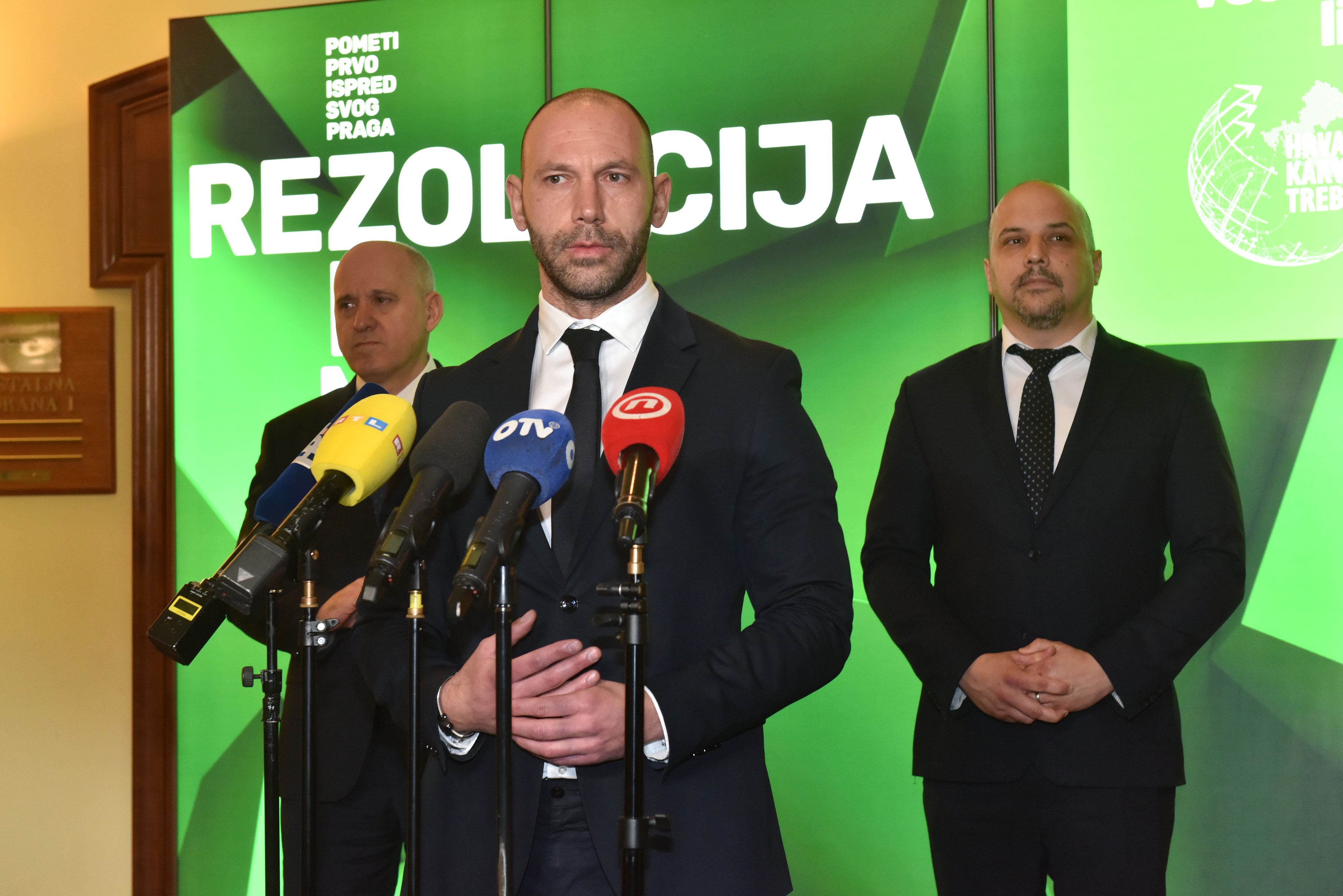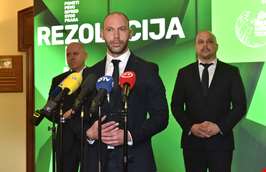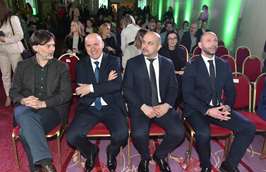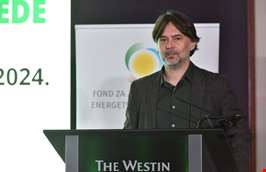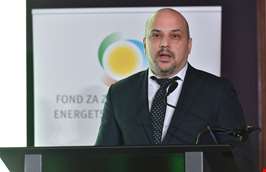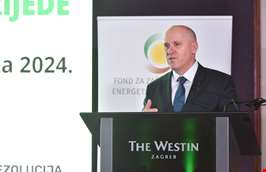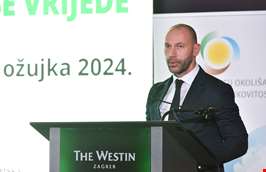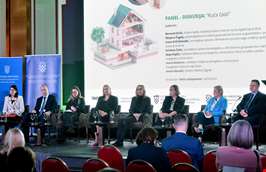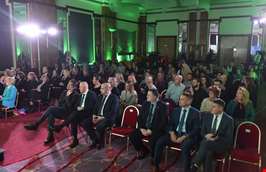08.03.2024.
The conference entitled "Houses that save more - are worth more" was held today at the Westin Hotel in Zagreb, and was attended by Branko Bačić, deputy Prime Minister of the Republic of Croatia and minister of physical planning, construction and state assets, Damir Habijan, the minister of economy and sustainable development, and Luka Balen, the director of the Environmental Protection and Energy Efficiency Fund.To underline the importance of energy renovation projects, deputy Prime Minister Bačić emphasized decarbonisation as a priority in all activities. "Both nature and science have been signalling we should start thinking differently about the way we organise our cities, because they have the greatest impact on the environment. In this context, the importance of the call for the energy renovation of family houses is unmistakable, including the call for the co-financing of energy renovation of apartment buildings with EU funds," Bačić said, adding that so far about 1,400 residential buildings had been renovated, while 387 apartment buildings at risk of energy poverty were under renovation. "Even in the reconstruction of buildings damaged by the earthquake, we recognised the opportunity to immediately renovate them not only structurally, but in terms of energy efficiency, and for this purpose we have provided 2.5 billion euros. However, the challenge we now face has nothing to do with securing financing, but how to spend those funds as soon as possible. The main question is whether we have enough construction workers. With the 8.4% growth of the construction sector, it was necessary to provide enough expert who have to supervise energy renovation with the predicted dynamics of renovation of about 3% of the surface area per year, which is why we will set up a special graduate study programme", said minister Bačić.
Minister Habijan is confident that these results, including energy renovation programmes, are proof that we are witnessing the energy transformation of Croatia. The goal is to produce as much energy as possible on our territory, and this is especially relevant for the production of energy from renewable sources. "Apart from the wind and solar power, there is also significant geothermal potential that we can use, and the Croatian Hydrocarbon Agency received substantial EU funding for its exploration. In addition to an unprecedented amount for the energy renovation of houses that is consistent with the energy efficiency policy, there are also opportunities offered to companies by the Modernisation Fund", said Habijan, announcing a call for proposals worth 37.8 million euros for the production of energy from renewable energy sources, and calls for proposals worth 80 million euros each for high-efficiency cogeneration and heating.
Director Balen explained that the Fund has been active in the field of “green” and “sustainable” for 20 years. "Half of that time our focus was on energy renovation because we recognised it had potential for not only energy or financial savings, but for improving the quality of life of our citizens. Among other things, we have so far co-financed the renovation of over 25,000 family houses. This year we have a call worth as much as 120 million euros, so this number will be much higher,” announced Balen in his opening speech at the conference.
Head of the Energy Efficiency Sector at the Fund Maja Rajčić presented the main information regarding the Public Call, which is expected to provide funding for the renovation of about 10,000 family houses. She reminded participants that funds are available for homeowners with residence registered at the address of the house, which must not exceed the surface area of 600m2 or have up to 3 dwelling units. Depending on the measures being financed, all relevant documentation must be submitted, and the application for co-financing will be submitted via the Fund's app through the NIAS authentication system with a substantial level of security credentials.
State secretary Bernard Gršić explained more about the structure of the application itself, pointing out that both green and digital transformation were happening at the same time, which was an ideal opportunity for citizens to take on digital services even more. The e-Građani system is used by more than 1.9 million citizens and it has so far recorded 175 million entries. He believes that this call will be an additional motivation for citizens to use digital services, which are by their nature more sustainable and "greener" than sending hard copy materials. Reiterating back to energy renovation, Irena Križ Šelendić from the Ministry of Physical Planning, Construction and State Assets said that Croatia had a relatively old building stock, which should definitely be made more efficient and comfortable for living. It is clear from Croatia’s strategic documents that the plans are ambitious, and this call is one of the ways in which all citizens can contribute to achieving these goals. The whole process is time-consuming, but each and every renovation counts. Kristina Čelić from the Ministry of Economy and Sustainable Development agreed with her, stressing the importance of achieving Croatia’s goals in terms of energy, including energy production in family houses. Rajčić emphasised that the Fund had thus far disbursed funds for about 3,000 power plants on the roofs of family houses, and that many more had been contracted. The Fund has been implementing the energy renovation programme for 10 years and everyone involved had not only a positive experience, but also long-term benefits. That the economy also benefits from energy renovation is the opinion of the Croatian Chamber of Economy’s vice president for construction and transport Mirjana Čagalj, who stated that one million euros invested in energy renovation in the EU employed 17, and in Croatia as many as 30 additional workers.
Anton Marušić, the director of Elektra Zagreb, said that workers installing photovoltaic power plants had been very busy considering that HEP had issued more than 7,500 permits for permanent operation, with 57 MW of connected power. He explained that the operating hours of these power plants were approx. 1300-1400 hours, and they represented a significant step forward in the energy transition. Marušić added that there were about tenfold more requests compared to 2020, and before issuing a permit for permanent operation, it was important to check in detail all submitted documentation in order to ensure constant voltage for users to whom this energy would be supplied. Such power plants reduce energy losses by 10-30%, which is also important in the context of energy savings. Vesna Bukarica, an expert at the Energy Institute Hrvoje Požar, reminded that scientists had been warning about climate change for a long time, and we could witness it on a daily basis, so it was high time to become aware of it and do something about it. More than three-quarters of GHG emissions come from the energy sector, and all that energy is consumed by us. It is the eleventh hour to reduce consumption, to use energy responsibly and to transform the way we produce it. Bukarica concluded that each individual should take responsibility and it was important to change our behaviour, but also take advantage of every opportunity like this one that was provided through the Fund's programmes.
The conference was organised in partnership by the Environmental Protection and Energy Efficiency Fund and Večernji list.
